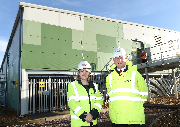 Parliamentary Under Secretary of State at the Department of Energy and Climate Change Amber Rudd MP has today welcomed the start of trials at the largest electricity storage facility of its type in Europe.
Parliamentary Under Secretary of State at the Department of Energy and Climate Change Amber Rudd MP has today welcomed the start of trials at the largest electricity storage facility of its type in Europe.
After extensive testing of the giant battery – known as the Smarter Network Storage facility at Leighton Buzzard, Bedfordshire – it will now be trialled for two years by UK Power Networks, which distributes electricity in the East of England, London and the South East.
As the future of electricity networks changes in the coming years it is essential that network operators invest in new and innovative technologies that allow them to adapt and continue providing the best service to their customers.
By broadening the industry’s experience of large-scale storage in the most cost-efficient way, the project should help demonstrate how batteries can be used to make electricity networks more efficient and enable more low carbon technologies to be incorporated into existing electricity networks.
The Smarter Network Storage project has involved installing a 6MW/10MWh ”big battery” at one of Leighton Buzzard’s main substation sites, which is large enough to:
· Power about 6,000 homes for 1.5 hours at peak times, or
· Power about 1,100 typical UK homes for a whole day during average or low demand times, or
· Power more than 27,000 homes for an hour.
The building itself is approximately 760 square metres – about the size of three tennis courts – and is divided into two main rooms: one houses the transformers and inverter units that convert electricity from direct current to alternating current. The other room houses the battery racks and modules where the energy is actually stored.
The trials aim to explore ways to maximise the value from energy storage, by offering multiple benefits from the storage to both the local network and the wider UK system.
Ms Rudd today toured the site before officially switching on the facility.
She said: “It’s great to see first-hand this innovative project – the biggest of its kind not just in the UK but across the whole of Europe.
“Cutting edge smart networks like this will both enhance UK skills and allow us to capture and store new forms of energy generation. This will help us to build a smart grid, which reduces the need for further costly investment in grid reinforcement by enabling greater integration of cleaner renewable energy sources into our existing energy network. That is why schemes like the ‘Big Battery’ are so important for our ambition to move to a low carbon economy.”
Barry Hatton, UK Power Networks’ director of asset management, said: “Today marks the start of the two-year trail, during which we will test a wide range of different services that storage can deliver to the network, and the wider electricity system.
“The project involves a range of commercial and technical trials to explore and improve the economics of electrical energy storage, allowing storage to benefit the electricity system in a number of sustainable and flexible ways. We have also been developing a first-of-a-kind platform to help us optimise and manage a wide range of different services that the storage can provide.”
The significant knowledge and learning from the trials, which includes research and recommendations into future regulatory and market frameworks for storage, will be shared with other network operators, trade associations, the Government and regulator Ofgem, and will support the industry in assessing the full potential of electrical storage, enabling more efficient use of storage in the future and reducing overall costs for customers.
Barry added: “The team have worked incredibly hard to have successfully built Europe’s biggest network-connected battery – a complex technical engineering project.
“This project will have an impact not only for Leighton Buzzard but also nationally and internationally. What we learn here from this exciting and important development will be vital for future similar schemes.”
Smarter Network Storage was awarded funding of £13.2m from the Low Carbon Networks Fund. This was supplemented with £4 million from UK Power Networks and £1.2 million from project partners – a mix of businesses and academic institutions which are helping to deliver Smarter Network Storage.


